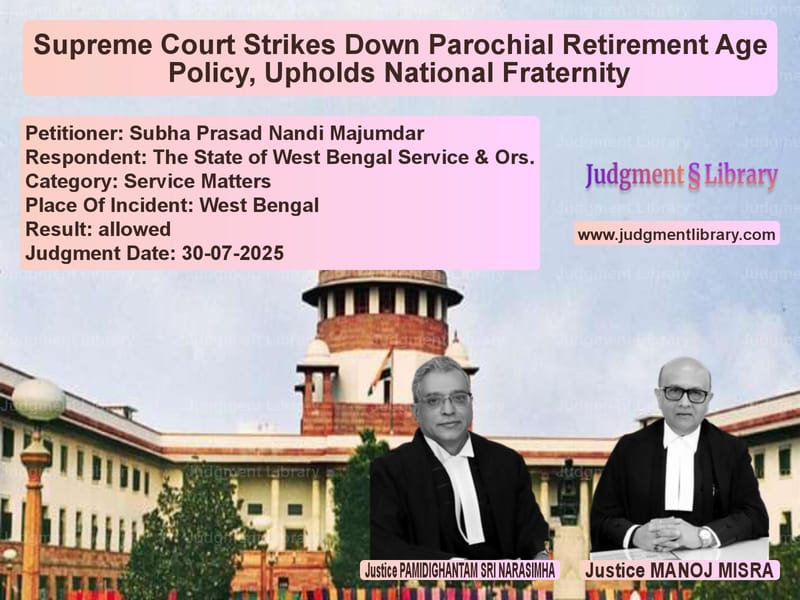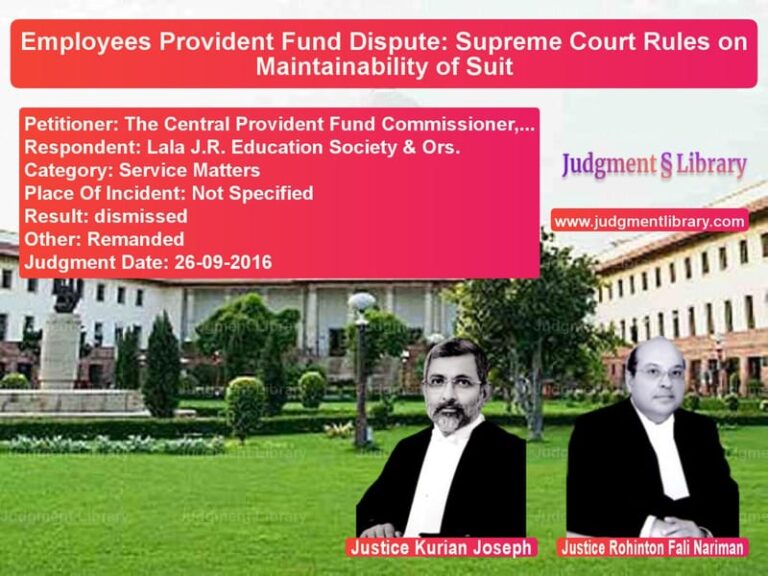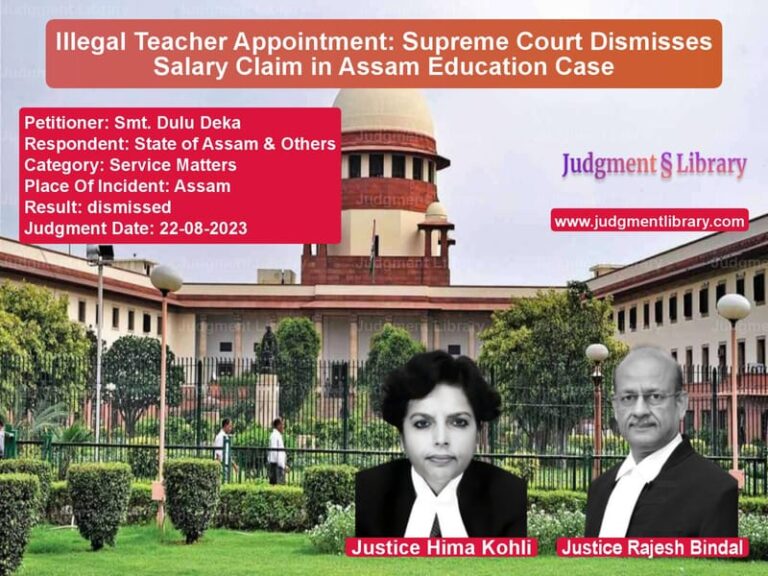Supreme Court Strikes Down Parochial Retirement Age Policy, Upholds National Fraternity
In a landmark judgment that reinforces the constitutional principle of fraternity and strikes down parochial policies in public administration, the Supreme Court has delivered a powerful verdict protecting the rights of government employees against discriminatory retirement policies. The case of Subha Prasad Nandi Majumdar versus The State of West Bengal Service & Ors. involves a university employee who was denied the benefit of enhanced retirement age because his teaching experience came from outside West Bengal, despite having served the state for fourteen years.
The legal battle began when the State of West Bengal issued a Memorandum dated February 24, 2021, increasing the retirement age from 60 to 65 years for university teachers and certain non-teaching staff. The benefit was extended only to those who had acquired a minimum of 10 years of continuous teaching experience in “any State-aided university/college.” The appellant, Subha Prasad Nandi Majumdar, had initially served as a teacher at Cachar College in Assam from 1991 to 2007 – a continuous period of 16 years. In 2007, he was selected by Burdwan University in West Bengal for the post of Secretary, Faculty Council for Post-Graduate Studies in Science, and was later promoted in 2012.
When Majumdar sought the benefit of the enhanced retirement age in 2023, the university informed him that he would retire at 60 because he lacked teaching experience in a “university or college aided by the State of West Bengal.” This rejection came despite his fourteen years of service to the West Bengal university system and his previous 16 years of teaching experience in Assam.
The Calcutta High Court’s Single Judge initially ruled in Majumdar’s favor, holding that the word “any” used before “State-aided university” was wide enough to include teaching experience outside West Bengal. However, the Division Bench reversed this decision, holding that the Memorandum had to be read in light of the parent statute – the West Bengal Universities (Control of Expenditure) Act, 1976 – which defined relevant terms to include only institutions within West Bengal.
The Supreme Court, in its judgment delivered by Justice Pamidighantam Sri Narasimha, made several profound observations about constitutional values and administrative fairness. The court stated: “When such decisions are subjected to strict scrutiny in judicial review, they unfortunately expose themselves as parochial, potentially undermining our resolve of fraternity. Executive decisions such as these seem minor or simple errors of perception but have far reaching consequences.”
The court emphasized the constitutional court’s duty to protect fraternity: “Constitutional courts must be vigilant and identify such decisions, embedded in the nooks and crannies of public administration and set them aside, for they have the potentiality of triggering similar actions by other States and their Instrumentalities. The appellant asserted his right to equality, which claim like that of liberty is easier to address in a court of law. However, the principle of fraternity never asserts itself. It is the duty of the constitutional court to recognise its erosion, even in the bylanes of public administration and to restore the essential ‘We’ to ensure the unity and integrity of the nation.”
The Supreme Court carefully analyzed the Memorandum and the relevant statutory provisions. The court noted that the appellant was selected in 2007 based on his qualifications and experience from Assam, which were never considered inadequate during his fourteen years of service. The court observed: “For the first time when the appellant sought the benefit of Notification dated 24.02.2021, the respondents took the stand that the appellant did not have the qualification of having continuously served for 10 years in the State Aided University or College.”
The court rejected the state’s argument that the Memorandum must be interpreted in light of the statutory definitions. The judgment stated: “We do not agree. The amendment of Section 4, even as it stood before its amendment in 2017 was to provide that employees of a university or any college affiliated to such university shall retire from service on attaining the age of 60 years, subject to the condition that they are in receipt of pay in the revised scales. The important part of this provision is that the teacher must be receiving scales of pay. In other words, the emphasis is on regular employment.”
The Supreme Court clarified the purpose behind the condition of teaching experience: “The Notification dated 24.02.2021 simply incorporates the expression ‘in any State-aided University or Government-aided College’ as in Section 4, conveying the context of employment in an aided institution. The purpose of the Notification is not to exclude those who had acquired the 10 years of teaching experience from universities or colleges outside West Bengal.”
The court found the classification arbitrary and discriminatory: “Extension of the retirement date, dependent on past experience of teaching in a university or a college located in West Bengal alone has no object to subserve and as such classification of employers into those who have acquired teaching experience in West Bengal and those who acquired such experience outside West Bengal is artificial, discriminatory and arbitrary. The stand taken by the state and the university is illegal and violative of the equality norm as enunciated by this Court.”
The judgment emphasized: “To insist on past teaching experience of 10 years within the State of West Bengal for extension of service, particularly when the employee has already worked for fourteen years is arbitrary and illegal.”
The Supreme Court relied on its earlier precedent in J.S. Rukmani v. Govt. of T.N., where it had held against making distinctions based on the place where a government servant last served. The court also referenced Harshendra Choubisa v. State of Rajasthan, where it struck down extra marks for applicants from particular districts, holding that “the criterion of merit cannot be allowed to be diluted by taking resort to such artificial differentiation and irrelevant assumptions.”
The court pointed out the absence of any rational basis for the classification: “There is evidently no material to show how an employee who has already served the university for fourteen years will be better qualified for extension of service only if his or her past experience of teaching is only in State of West Bengal. The minimum that the State or the University needs to prove is to place on record the material that would demonstrate that non-teaching posts, with respect to which the state has decided to extend the facility of extended date of retirement, somehow require experience gained through teaching in West Bengal.”
The judgment concluded: “We see nothing more than an artificial classification. It is a classic case of a suspect classification intended to sub-serve only parochial interests and nothing more. To insist on such a requirement for extension of date of retirement is totally unjustified.”
The Supreme Court allowed the appeal, set aside the High Court’s judgment, and declared that the appellant was entitled to the benefit of the enhanced retirement age. The court also imposed costs of Rs. 50,000 on the respondents.
This judgment represents a significant reinforcement of constitutional values in administrative decision-making. It sends a clear message that parochial policies that create artificial barriers between citizens of different states have no place in a nation committed to fraternity and unity. The Supreme Court’s strong stance against regional discrimination in employment benefits establishes an important precedent for protecting the rights of employees who move between states, ensuring that their service and experience are valued regardless of geographical boundaries.
Petitioner Name: Subha Prasad Nandi Majumdar.Respondent Name: The State of West Bengal Service & Ors..Judgment By: Justice PAMIDIGHANTAM SRI NARASIMHA, Justice MANOJ MISRA.Place Of Incident: West Bengal.Judgment Date: 30-07-2025.Result: allowed.
Don’t miss out on the full details! Download the complete judgment in PDF format below and gain valuable insights instantly!
Download Judgment: subha-prasad-nandi-m-vs-the-state-of-west-be-supreme-court-of-india-judgment-dated-30-07-2025.pdf
Directly Download Judgment: Directly download this Judgment
See all petitions in Employment Disputes
See all petitions in Pension and Gratuity
See all petitions in Public Sector Employees
See all petitions in Termination Cases
See all petitions in Other Cases
See all petitions in Judgment by P.S. Narasimha
See all petitions in Judgment by Manoj Misra
See all petitions in allowed
See all petitions in supreme court of India judgments July 2025
See all petitions in 2025 judgments
See all posts in Service Matters Category
See all allowed petitions in Service Matters Category
See all Dismissed petitions in Service Matters Category
See all partially allowed petitions in Service Matters Category







